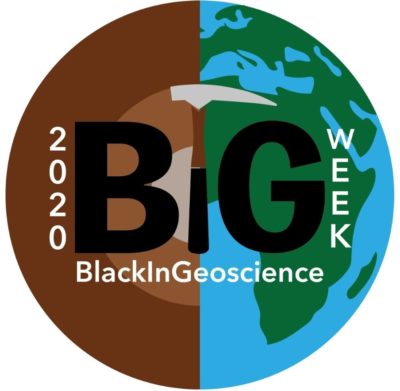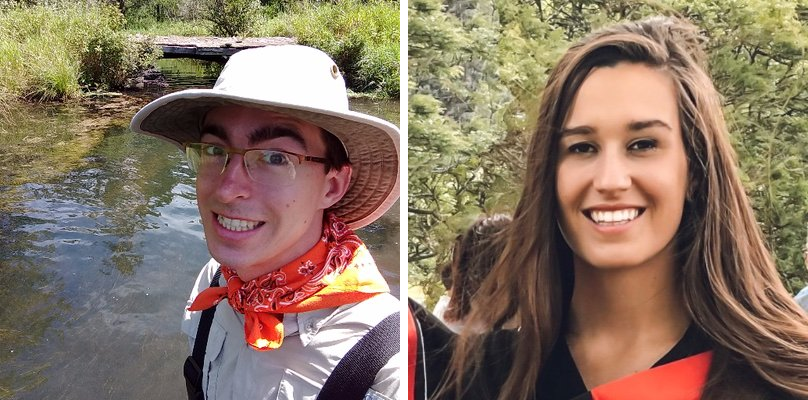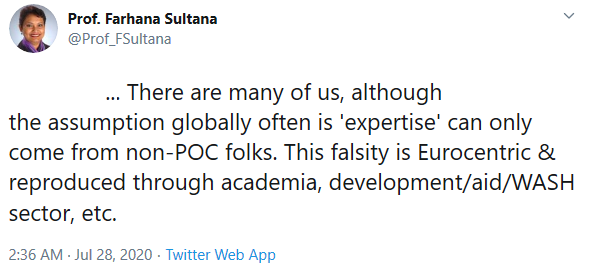
The Water Researchers of Color (WaterPOC) database is a resource that aims to add to numerous efforts in the last year to raise awareness of Black, Indigenous, and people of color (BIPOC*) in science, in this case specifically multiple disciplines intersecting with water. This resource mirrors many others, such as 500 Queer Scientists and 500 Women Scientists and numerous other databases [1], which share the goals of uplifting diverse researchers in many fields. While the WaterPOC database is not a new idea, it is a much-needed tool to support efforts of diversity, equity, and inclusion in the field of water research.
Initiatives to increase gender and racial diversity in the STEM fields (Science, Technology, Engineering, Maths/Medicine) have seen gradual improvement in recent years. Problematically, some have suggested that the lack of entry of BIPOC into these fields is driven by a lack of ‘passion’ for STEM topics. As some recent popular Twitter campaigns such as #BlackInGeoscienceWeek, #BlackBirdersWeek, and #LatinoConservationWeek have highlighted, there is no lack of passion for science and nature in racialized** [2] communities. Instead, recent research highlights that racialized individuals are systematically excluded from post-graduate careers by an exclusionary and hostile environment [3]. Personal examples can be seen Tweeted under the hashtag #BlackInTheIvory. This leaves very few people of color high on the career ladder [4-5] to serve as role models and mentors to support students trying to overcome the hurdles currently present in academia.
Among racialized** researchers, Black and Indigenous individuals, in particular, have been underrepresented [4] and face unique barriers in both public and professional [6] life. Those at the intersections of multiple identities, including, but not limited to, race, disability, sexuality, gender identity, and socio-economic background, face exacerbated barriers to participation and success [7-8].
In a call for a “Robust Anti-Racist Action” for the Geosciences, Hendratta Ali and others [9] stress that everyone needs to listen and work to understand the experiences faced by their racialized colleagues.
It is important to recognize that BIPOC have already done much work to pave the road ahead. In a recent Nature comment [10], a set of recommendations were outlined to promote Black excellence in academia. Among the recommendations, the authors called for improving the visibility and opportunities provided to BIPOC scientists. At the moment, we are on the crest of a wave of the conversation of diversity in STEM, but the work ahead requires sustained and proactive efforts from all of us to lift up researchers of color and create an anti-racist academy.
Building on the anti-racism action plans from Hendratta Ali and others [9] and Christopher Schell and others [10], the WaterPOC database of researchers of color can assist in improving diversity, equity, and inclusion in water research in the following ways:
- Increase the visibility of BIPOC researchers and their research to their peers;
- Offer a list of scholars to facilitate the representative selection of researchers for symposia, keynote addresses, panels, and other related opportunities;
- Provide a list of role models for students of color;
- Facilitate nominations and recruitment of BIPOC researchers for awards, leadership positions in prestigious journals and professional societies, and paid positions;
- Offer a list of researchers that can be used to build peer-mentoring networks among people of color who may feel isolated in their field.
We encourage everyone to share the database with scientists at all career stages. You can submit your information here and browse the database here. For any inquiries about the database please contact the creators Tyler Hampton and Danyka Byrnes.
 This post is part of the global #BlackInGeoscience week (6-12 September), written by Tyler Hampton and Danyka Byrnes, who are PhD Candidates at University of Waterloo.
This post is part of the global #BlackInGeoscience week (6-12 September), written by Tyler Hampton and Danyka Byrnes, who are PhD Candidates at University of Waterloo.
Edited by Sina Khatami
Endnotes
* We use the acronym BIPOC (Black, Indigenous and People of Color). The BIPOC Project describes the term: “We use the term BIPOC to highlight the unique relationship to whiteness that Indigenous and Black (African Americans) people have, which shapes the experiences of and relationship to white supremacy for all people of color within a U.S. context. We unapologetically focus on and center relationships among BIPOC folks.” Despite the North American applicability of this term, we want to stress that Black and Indigenous peoples have experienced the brunt of racial violence in other colonized or colonizing countries (e.g. Europe).
** We use the term racialized in this post with intention. The Alberta Civil Liberties Research Centre [2] describes the term: “The term racialization can be used to understand how the history of the idea of “race” is still with us and impacts us all, though differentially. The term emphasizes the ideological and systemic, often unconscious processes at work. It also emphasizes how racial categories are socially constructed, including whiteness, but are socially and culturally very real.” We recognize that people can choose different words to describe themselves and there is broad use of this term in communities and in literature.
References
- Glass, J. & Monteagudo, M. Databases of Databases of Diverse Speakers in STEM. https://docs.google.com/document/d/1dASiA5MIXKEHQe3T9jIsn2DuleHeXPNW_fKb5_L08Og/ (2018).
- Alberta Civil Liberties Research Centre. Racialization. http://www.aclrc.com/racialization.
- Marín-Spiotta, E. et al. Hostile climates are barriers to diversifying the geosciences. Advances in Geosciences (2020) doi: https://doi.org/10.5194/adgeo-53-117-2020.
- Bernard, R. E. & Cooperdock, E. H. G. No progress on diversity in 40 years. Nature Geoscience 11, 292–295 (2018). doi: https://doi.org/10.1038/s41561-018-0116-6.
- Dutt, K. Race and racism in the geosciences. Nature Geoscience (2019) doi: https://doi.org/10.1038/s41561-019-0519-z.
- Boykin, C. M. et al. Anti-racist actions and accountability: not more empty promises. Equality, Diversity and Inclusion: An International Journal (2020) doi: https://doi.org/10.1108/EDI-06-2020-0158.
- Núñez, A.-M., Rivera, J. & Hallmark, T. Applying an intersectionality lens to expand equity in the geosciences. Journal of Geoscience Education 68, 97–114 (2020). doi: https://doi.org/10.1080/10899995.2019.1675131.
- Pickrell, J. Scientists push against barriers to diversity in the field sciences. Science (2020). doi: https://doi.org/10.1126/science.caredit.abb6887.
- Ali, H. et al. A Call for a Robust Anti-Racist Action Plan from All Professional Geoscience Societies and Organizations. (2020). https://www.change.org/p/geoscientists-call-for-a-robust-anti-racism-plan-for-the-geosciences
- Schell, C. J. et al. Recreating Wakanda by promoting Black excellence in ecology and evolution. Nature Ecology & Evolution (2020) doi: https://doi.org/10.1038/s41559-020-1266-7.



Pingback: GeoLog | A helping hand: what career support does EGU offer?